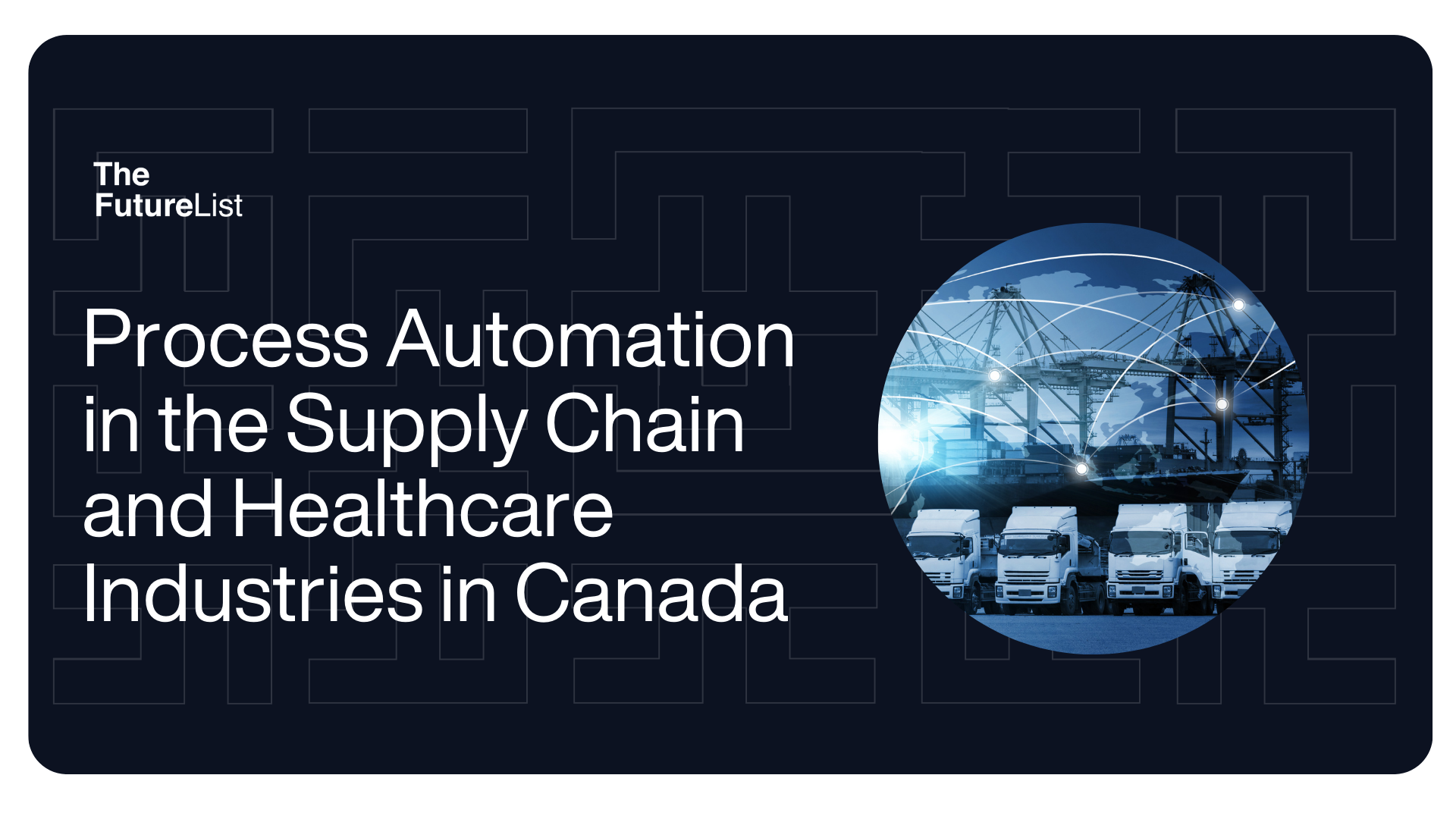
Process Automation in the Supply Chain and Healthcare Industries in Canada
by Lucy Kinyua
Process Automation refers to the utilisation of technology to execute routine, repetitive tasks and processes without direct human intervention. This entails the application of various technologies, including artificial intelligence, robotics, and software to streamline and optimise workflows, enhance efficiency, and reduce the dependency on manual labour in routine operations.
This Snapshot highlights six SaaS companies in Canada that are using process automation to improve the efficiency of supply chain and healthcare industries.
Company Profiles
Healthcare:
Sowingo is a Toronto-based cloud-based eCommerce and dental inventory management solution designed to streamline the purchasing process of dental supplies and monitor inventory levels. The platform offers a large catalogue of online products at exclusive discounts, allowing dental practices to optimise their efficiency by pairing the Sowingo Marketplace with a robust inventory system and control feature. The platform includes features for tracking and managing inventory and provides reports and analytics to help dental health practitioners manage their inventory more effectively.
Phelix.ai is an Al-powered automation platform that alleviates admin burden and connects healthcare workflows across the patient journey – including the inbox, faxes, phone calls, SMS, email, scheduling, tasks, prior auth, registration, payments and check-in. Phelix uses Al, automation, and event-driven interfaces to integrate alongside or within EHR’s, RIS’s, HIS’s, and other portals or apps, with minimal disruption to existing workflows. They also provide API for healthcare applications.
Supply Chain:
Morpheus Network is a Canadian blockchain-agnostic supply chain SaaS middleware platform specialising in providing solutions to digitise, optimise, and automate global supply chain operations for both companies and government organisations. They leverage IoT and blockchain technologies for digitisation and process automation to help companies integrate new technologies with legacy supply chain systems to boost efficiency. The platform utilises automated work contracts, shipping, and customs documents with multi-flow payments in any currency.
Moselle is a tech startup based in Toronto, Canada, focused on automating operations for consumer brands, with an emphasis on inventory planning and demand management. The company’s tools are designed to simplify and automate the importing process for businesses, enabling accurate tracking of purchase orders and currency exchange changes. The role of these tools is to determine how much product to order, when to order it, and to automatically place the order. In addition, Moselle provides insights on various aspects of running an importing business, including supplier relationships, risk management, and eCommerce profitability.
Notch is a Canadian financial technology company that provides a platform for food service businesses to automate their invoicing, payments, and orders digitally. The company’s platform is designed to help restaurants and distributors save time and money by streamlining their financial processes and integrating with existing platforms such as Quickbooks and Microsoft Dynamics 365. Notch offers a range of products and integrations to meet the needs of its customers and helps restaurants and distributors get paid faster.
Edisoft is a Toronto-based global software company that provides a configurable Smart Process Supply Chain Service Platform. The company’s platform is designed to help manufacturers and distributors improve supply chain performance by leveraging data as a strategic asset. Edisoft’s services include optimised and automated Vendor Compliance, Warehouse Fulfilment, and Carrier Management services in a single, seamlessly integrated system. The platform offers a range of features including order management, inventory control, shipping automation, and business intelligence. The company’s solutions are designed to integrate with a variety of ERP systems and are aimed at small to medium-sized businesses.
Challenges and Future Outlook
Process automation, while advancing in healthcare and supply chain industries, faces integration complexity, especially in legacy infrastructures. Future solutions may arise through innovations in interoperability and middleware. Security concerns, including cyber threats, accompany increased automation, but the future envisions improved cybersecurity measures and secure-by-design principles. Human-automation collaboration challenges highlight the need for workforce upskilling and new roles in maintenance. Customisation hurdles may be overcome with adaptive systems, and ethical considerations could be addressed through frameworks and clear regulations. Navigating these challenges promises a resilient future for process automation in diverse sectors.
In summary, process automation is crucial in modern business environments to achieve operational excellence, improve competitiveness, and meet the demands of a rapidly evolving digital landscape. As technology continues to advance, the strategic adoption of process automation becomes increasingly integral to organisational success across various industries.
Get innovation insights from The FutureList weekly. Subscribe to our newsletter here.
Categories
- Agritech
- Artificial Intelligence
- Biotech
- Blockchain
- Climate Tech
- Data Infrastructure
- Edtech
- Events
- Fashion
- Fintech
- Healthtech
- Infrastructure
- Innovation Memos
- Innovation Scout Program
- Insight
- Insurtech
- Machine Learning
- Martech
- Mobility
- Music and Media
- Partner Offers
- Perks
- Procurement
- Proptech
- Retailtech
- Ridehailing
- Ridesharing
- Robotics
- Space Aviation
- Supply Chain
- Talent
- Telecoms
- Uncategorized
- Venture Capital
- Wastetech
- Women In Tech
Recent Posts
- The Formula for Future Speed: Data-Driven Performance in Racing
- Leveraging Next-Gen Endoscopic Interventions and Innovations for Healthcare
- Inside the Quiet Work of Operationalizing AI Ethics in Government
- The Evolution and Impact of DNA Cloning Technology
- The Infrastructure Layer for Ethical Supply Chains